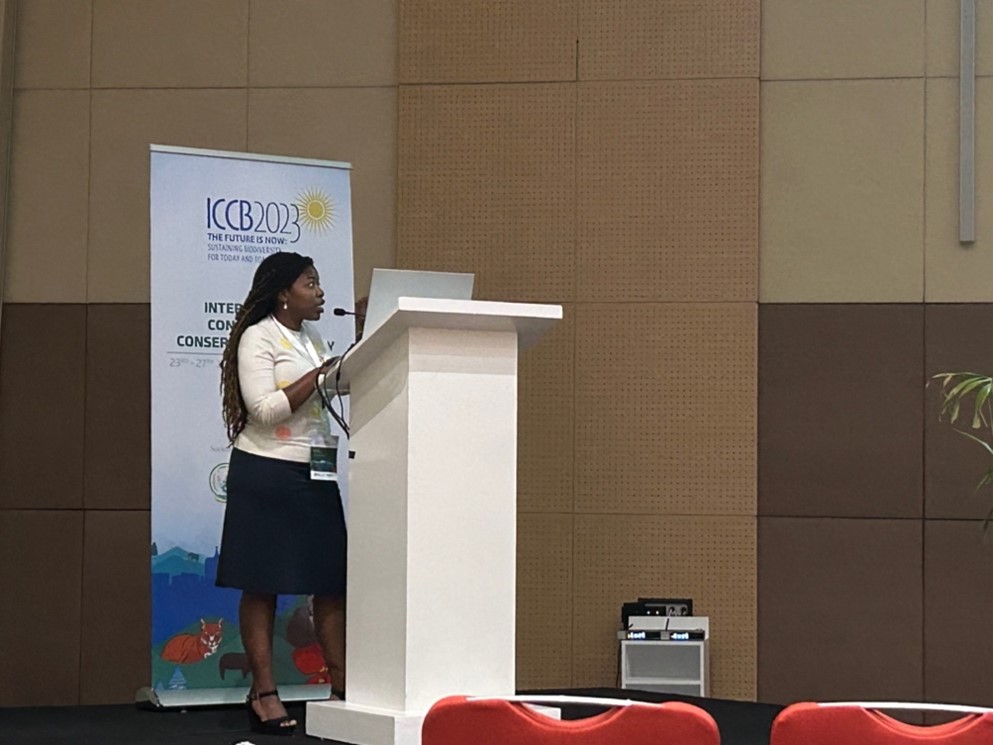University of Oxford
11a Mansfield Rd
OX1 3SZ
UK


During the summer of 2023, I travelled to Kigali, Rwanda, for the 31st International Congress for Conservation Biology (ICCB). The conference run from 24th to 27th July, 2023. Although this was the 31st ICCB conference, the excitement that springs from being part of it continues not only because it was my first ICCB conference but because I also had the pleasure and privilege to present some of my PhD work (one of my chapters on human-nature interactions and their implications on livelihoods and conservation in a shared landscape). Between presenting my work, networking and attending different talks, I also had the opportunity to volunteer at the Women for the Environment (WE Africa) booth, where I could talk about my experiences as a WE fellow and what it means to be part of the community, especially as a young African woman working in the conservation space.
The Highlights and the Program
I was thrilled to see a great representation of academicians, practitioners, and students from Africa, Asia, America, and Europe. Everywhere in the world! Whenever we interacted, we had something insightful to share. I was inspired!
One other fascinating aspect of the conference was the program. I initially thought that since it’s ICCB, the program would be filled with ecological topics. Still, to my surprise, the forum was filled with many interdisciplinary issues, including gender, art, compliance, science communication, and much more. The unfortunate thing was having to choose which session to attend as all sessions were exciting and sometimes could happen simultaneously. So, I have learnt not to brush off conferences but to allow them to speak for themselves. They may be just as enriching and as memorable!

I also had the privilege to meet researchers whose works have been inspirational and instrumental to me. Meeting with them at the forefront of their fields and hearing about their research experiences and interests gave me great inspiration, optimism, and courage for the work that we do.
Seeing Africa being presented in the talks and plenaries was also a remarkable and fulfilling experience. There was even a session on Africa and the diaspora!
Another great thing about the conference was the proximity between the conference hall and supermarkets, which allowed everybody to quickly get to the nearest supermarket for supplies and snacks and return in time for the afternoon sessions.
The Booths


Conservation Optimism was well presented by having a booth where one could draw anything that gives them hope for the future, aside from explaining why they are conservation optimists. Seeing awkward and funny art was funny and amazing to read. I am sure I was not the only one who was inspired (or still is) that despite everything happening in our world, from global warming to species extinction, people are hopeful for a better future for both people and nature.
Women for the Environment (WE)- a movement and career-development program that equips and empowers women in the conservation space across sub-Saharan Africa- also had a booth. Being a WE fellow, the booth, for me, was a place to refresh from all the craziness of the conference and to connect with other fellows (we call ourselves sisters) who were present at the booth. It was like having a safe space within the conference premises.
A Strong Support System
Being a classic introvert, it suffices to say that the idea of presenting at such a big conference was nerve-wracking initially. However, the presence of the Interdisciplinary Centre for Conservation Science (ICCS) lab members (past and present) made a lot of difference, and I can say with so much enthusiasm and exhaustion at the same time, if such a thing exists, that I am so glad I had the opportunity to go. When running through different sessions, you would meet a familiar face to say hi or to give a wave. Even when presenting and looking into the room, someone was always familiar. All work and no play are not good for the soul. For the ICCS research group, it was never all about work and zero play. Then they would change their name! So, apart from patronising the conference very well, we had time to socialise and have fun.
Experience Worth it? Surely!
Aside from being in a culturally mixed environment, having the opportunity to exchange ideas and network with different people from all over the world, and working in a space surrounded by a healthy energy of optimism towards conservation, I would say that the 31st ICCB conference was a remarkable experience for me.
I am grateful to Jesus College (Charles Green Fund), the Eurofins Foundation and the Trade Hub project for supporting this experience. I treasure the skills, knowledge, networks and cultural insights I have gained in this experience.

